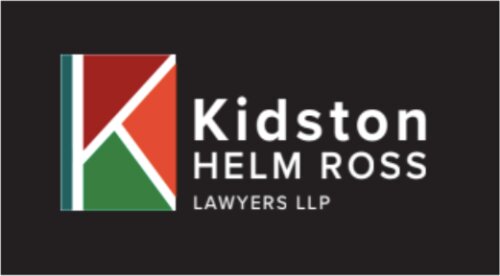Best Trusts Lawyers in Vernon
Share your needs with us, get contacted by law firms.
Free. Takes 2 min.
List of the best lawyers in Vernon, Canada
About Trusts Law in Vernon, Canada
Trusts are an integral part of estate planning and asset management in Vernon, Canada. They are legal arrangements where one party, known as the trustee, holds and manages property for the benefit of another party, the beneficiary. Trusts can serve multiple purposes, including asset protection, tax planning, and ensuring the orderly distribution of assets to heirs. In Vernon, as in the rest of British Columbia, trusts are governed by both provincial legislation and common law principles, ensuring that they are a flexible tool for managing various personal and financial needs.
Why You May Need a Lawyer
Legal advice is crucial when dealing with trusts, given their complexity and the significant legal implications involved. People may require legal assistance with trusts in various situations, such as:
- Setting up a new trust to manage and distribute assets according to specific wishes.
- Modifying an existing trust to reflect changes in circumstances or preferences.
- Resolving disputes between trustees and beneficiaries that may arise regarding trust administration.
- Navigating tax implications related to trust income and distributions.
- Understanding the trustee's responsibilities and managing fiduciary duties effectively.
An experienced lawyer can provide guidance, ensure compliance with the law, and help safeguard the interests of both trustees and beneficiaries.
Local Laws Overview
Trusts in Vernon are subject to the Trustee Act of British Columbia, which outlines the legal framework for creating and managing trusts. Key aspects include:
- Creation and Validity: Trusts must have clear intent, a specified purpose, and identifiable beneficiaries to be valid.
- Duties of a Trustee: Trustees are obligated to act in the best interest of the beneficiaries, manage trust assets prudently, and avoid conflicts of interest.
- Modification and Termination: Trusts can be modified or terminated under certain conditions, typically with the consent of all beneficiaries or by court order.
- Beneficiary Rights: Beneficiaries have the right to information and transparency about the trust's administration and assets.
- Legal Recourse: Parties may seek judicial intervention to resolve disputes or address breaches of trust.
Understanding these legal stipulations helps ensure that trusts are created and administered properly within the legislative framework.
Frequently Asked Questions
What is a trust?
A trust is a legal relationship where one party holds and manages property for the benefit of another party under specific terms and conditions.
Who can be a trustee?
Anyone who is of legal age and mentally competent can serve as a trustee. Trustees can be individuals or corporations authorized to offer trust services.
What types of trusts are common in Vernon?
Common types include living trusts, testamentary trusts, charitable trusts, and special needs trusts, each serving different purposes and circumstances.
Can a trust be challenged in court?
Yes, trusts can be contested on various grounds, such as lack of capacity, undue influence, or improper execution. Legal intervention may be necessary to resolve disputes.
Are trusts subject to taxes?
Trusts themselves may be taxed on income that is not distributed to beneficiaries, while beneficiaries may also incur tax liabilities on distributed income. Tax rules can be complex and require professional advice.
How does a trust differ from a will?
Unlike a will, which takes effect after death, a trust can be established and operational during the settlor's lifetime. Trusts offer greater flexibility and privacy compared to wills.
Can a trust be changed once it is created?
Revocable trusts can be modified or revoked by the settlor during their lifetime. Irrevocable trusts typically cannot be altered, except under specific conditions allowed by law.
How do I choose the right trustee?
Select someone trustworthy, capable of managing financial matters, and aligned with your intentions. Often, a professional trustee is appointed for their expertise and objectivity.
What is the role of the court in trust administration?
The court may intervene in trust administration to resolve disputes, interpret terms, or provide guidance to trustees, ensuring compliance with the legal framework.
Is legal advice mandatory when setting up a trust?
While not mandatory, seeking legal advice is highly recommended to ensure the trust is valid, compliant, and tailored to your specific needs and objectives.
Additional Resources
For further information and assistance regarding trusts, consider the following resources:
- British Columbia Law Institute: Offers research and publications on trust law in British Columbia.
- Public Guardian and Trustee of British Columbia: Provides services and information for administering and protecting trusts.
- Canadian Bar Association - British Columbia Branch: Offers resources and a directory to find qualified legal professionals specializing in trusts.
Next Steps
If you require legal assistance in the field of trusts, consider the following steps:
- Research: Obtain a basic understanding of trust laws and your specific needs or concerns.
- Consultation: Schedule a consultation with a lawyer specializing in trusts to discuss your circumstances and receive professional advice.
- Documentation: Gather relevant documents and information to expedite the legal process.
- Engagement: Select a reputable lawyer or law firm to represent your interests and guide you through the trust creation, management, or resolution process.
- Ongoing Review: Periodically review your trust arrangements to ensure they remain aligned with your goals and comply with any legislative changes.
Lawzana helps you find the best lawyers and law firms in Vernon through a curated and pre-screened list of qualified legal professionals. Our platform offers rankings and detailed profiles of attorneys and law firms, allowing you to compare based on practice areas, including Trusts, experience, and client feedback.
Each profile includes a description of the firm's areas of practice, client reviews, team members and partners, year of establishment, spoken languages, office locations, contact information, social media presence, and any published articles or resources. Most firms on our platform speak English and are experienced in both local and international legal matters.
Get a quote from top-rated law firms in Vernon, Canada — quickly, securely, and without unnecessary hassle.
Disclaimer:
The information provided on this page is for general informational purposes only and does not constitute legal advice. While we strive to ensure the accuracy and relevance of the content, legal information may change over time, and interpretations of the law can vary. You should always consult with a qualified legal professional for advice specific to your situation.
We disclaim all liability for actions taken or not taken based on the content of this page. If you believe any information is incorrect or outdated, please contact us, and we will review and update it where appropriate.









